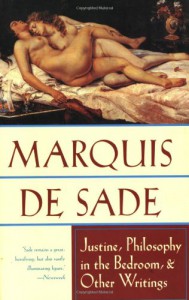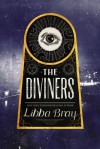grace
The Beats: A Graphic History
 The Joyce Brabner story is by far the best; the Jeffrey Lewis one about Tuli Kupferberg is also quite well done. Everything else is so dry ("he spent two years in California but then he returned to New York in July 1958" etc., etc.) that you'd be better off reading the Wikipedia articles. Also, most of the Beats were kind of assholes.
The Joyce Brabner story is by far the best; the Jeffrey Lewis one about Tuli Kupferberg is also quite well done. Everything else is so dry ("he spent two years in California but then he returned to New York in July 1958" etc., etc.) that you'd be better off reading the Wikipedia articles. Also, most of the Beats were kind of assholes.
The Rule of Four
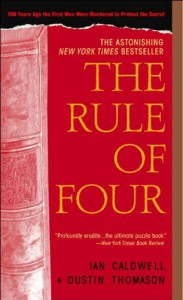 "You know who looks a little like Audrey Hepburn?" Gil asks suddenly, catching me off guard.
"You know who looks a little like Audrey Hepburn?" Gil asks suddenly, catching me off guard."Who?" I say.
He surprises me. "Katie."
"What made you think of that?"
"I don't know. I was watching you two tonight. You're great together.[...]You should hear how she talks about you. It's like you've known each other since you were kids."
"What do you mean?"
"I found her at Ivy once, taping a basketball game for you on the TV upstairs. She said it was because you and your dad used to go to the Michigan-Ohio State game together."
I hadn't even asked her to do it. Until we met, she'd never followed basketball.
"You're lucky," he says.
I nod my agreement.
The Invention of Hugo Cabret
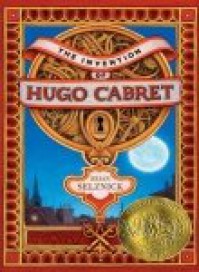 The unique format - a few pages of text, alternating with a few full-page, wordless pictures that also advance the story - makes this worth reading if you have an interest in experimental storytelling methods and such. Unfortunately, the story itself is not as good as I would like it to be. The characters are fairly one-dimensional, the emotional moments don't ring true, and the plot meanders, relying heavily on coincidence. The source material is interesting on its own, but I often got the sense of the author showing off his research, like when our hero thinks about the Gare Montparnasse train accident for no good narrative reason. It happened "thirty-six years ago," twelve-year-old Hugo recalls, accurately. Come on.
The unique format - a few pages of text, alternating with a few full-page, wordless pictures that also advance the story - makes this worth reading if you have an interest in experimental storytelling methods and such. Unfortunately, the story itself is not as good as I would like it to be. The characters are fairly one-dimensional, the emotional moments don't ring true, and the plot meanders, relying heavily on coincidence. The source material is interesting on its own, but I often got the sense of the author showing off his research, like when our hero thinks about the Gare Montparnasse train accident for no good narrative reason. It happened "thirty-six years ago," twelve-year-old Hugo recalls, accurately. Come on.On an odd note, there were at least four or five occasions where an important story moment was precipitated by a character falling down or crashing into something. This didn't seem like an intentional motif, just a lazy way to move the plot along.
I'm still glad I read this, again, for the interesting form, and because I learned about Georges Melies. But it doesn't live up to its potential.
Sleeper Vol 01: Out in the Cold
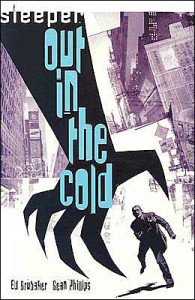 Noir spy thriller with superpowered heroes and villains. The spy stuff in particular was really convincing and well done. Unfortunately there are only two female characters, both of whose plot points revolve around relationships. And there's a lot of gratuitous nudity (I mean really gratuitous - like two dudes are having a conversation about important spy matters and a naked lady just happens to be walking by, filling up the panel). It didn't seem particularly misogynist, just juvenile and clueless. I will probably read the next one, because I've never found a comic that does the noir-spy-thriller thing this well.
Noir spy thriller with superpowered heroes and villains. The spy stuff in particular was really convincing and well done. Unfortunately there are only two female characters, both of whose plot points revolve around relationships. And there's a lot of gratuitous nudity (I mean really gratuitous - like two dudes are having a conversation about important spy matters and a naked lady just happens to be walking by, filling up the panel). It didn't seem particularly misogynist, just juvenile and clueless. I will probably read the next one, because I've never found a comic that does the noir-spy-thriller thing this well.
Assassination Vacation
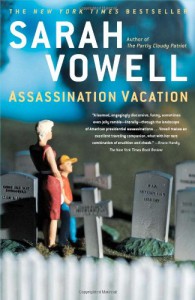 Meh. The historical stuff wasn't thorough enough and the author's personal "vacation" narrative wasn't well developed either. The whole book was really just a collection of scattered anecdotes. I learned a few interesting things, I just wish it had been more in-depth. For example: Charles Guiteau bought a special gun to assassinate President Garfield because "he imagined that someday, that particular weapon would look good in a museum." That's a fascinating detail, but it's not referenced so I have no idea how we know this. Annoying.
Meh. The historical stuff wasn't thorough enough and the author's personal "vacation" narrative wasn't well developed either. The whole book was really just a collection of scattered anecdotes. I learned a few interesting things, I just wish it had been more in-depth. For example: Charles Guiteau bought a special gun to assassinate President Garfield because "he imagined that someday, that particular weapon would look good in a museum." That's a fascinating detail, but it's not referenced so I have no idea how we know this. Annoying.


